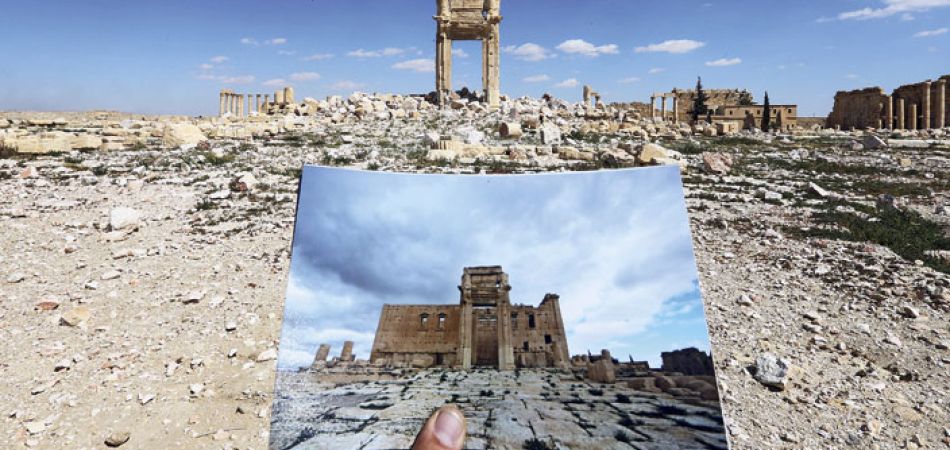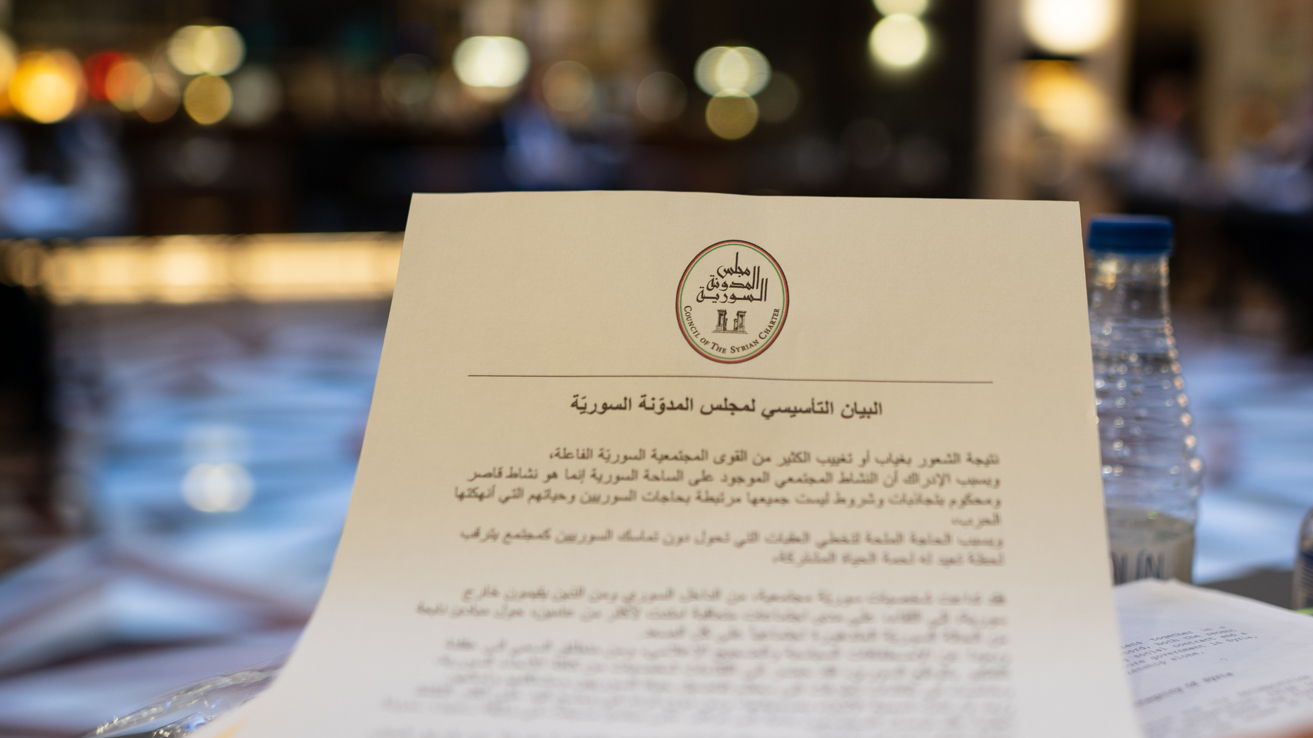The Council of the Syrian Charter has drawn inspiration from the various experiences of
countries that went through similar situations to Syria, without losing sight of the specifics of
the war in Syria, complete with its complexity and uniqueness.
In the following, I will endeavor to expand upon the last six principles of the Code of Conduct
for Syrian Coexistence:
Sixth Principle: Repair The Damage, Restitute and Compensate
Several conflict-torn nations have historically adopted this principle, paving the way for
building a future and as a cornerstone in the implementation of transitional justice. It is a
means of healing wounds, relieving tension, reducing feelings of hatred and revenge, and
consolidating the concepts of tolerance, reconciliation and mutual societal trust. This principle
deals mainly with the future of Syria, such that a sustainable civil peace is ensured.
It is important, however, to note that Syria has witnessed atrocities and destruction so horrific
that no one, in my opinion, can imagine its extent or have a real perception of the losses
inflicted on Syrians. It is rare, if not impossible, to find a Syrian who has not been affected by
this war in one way or another. The losses and the amount of destruction is greater than any
estimation.
Undeniably, this principle tackles a heavy and exhausting matter, yet one which is necessary
when it comes to addressing as complex a crisis as the Syrian conflict. This clause essentially
states that each person affected by the conflict in Syria is entitled to compensation
commensurate with the nature and extent of the damage suffered by them. Appropriate and
accurate mechanisms, based on recognized international legal bases, should be used to
implement this principle.
Syrians affected before the start of the conflict in 2011 are certainly not forgotten and are to
be compensated for the violations of their rights and confiscation of their properties and so on.
It goes without saying that implementing this principle requires enormous resources and it is
therefore that Syrian, regional and international efforts must be combined to reach this goal.
By implementing this principle in spite of all the difficulties it presents, it is possible to
overcome and address several catastrophic consequences of the war, and to provide serious
guarantees that such events will not be repeated in the future.
Seventh Principle: Human Suffering, Detainees, Prisoners and Missing Persons
This principle deals with another element of the atrocities and effects of the war and its
repercussions that might extend to the next generations. It complements the previous principle
in its overarching goal to achieve transitional justice. This clause deals with the crimes
committed against Syrians, some of which amount to war crimes and crimes against
humanity. Needless to say, international organizations’ reports show horrific numbers of
Syrian victims, from martyrs, to the wounded and disabled, those detained to those kidnapped
and still missing. Countless people need to be compensated, treated and cared for in a difficult
process that will take years or even decades. This principle therefore aims to reinstate a
dignified life for Syrians who have been subject to the most heinous violations. As such, all
necessary means and resources should be made available to implement it. The process of
implementing this will certainly be the responsibility of the future SyriainSyrian state and its
society. Notably, the Code of Conduct is also careful to note that this should also apply to the
cases that occurred before the start of the conflict in March 2011. This is particularly
important in how it contributes to treating the ancient roots of the conflict.
Eighth principle: The Diversity of Syrian Society
“Syria is a place that should be examined in order to see the coexistence of different religious
and ethnic societies, and to observe how it is dealt with immigration from and to Syria”, wrote
the German researcher Katja Brinkmann. This striking observation represents an important
perspective that we ought to bear in mind when seeking to understand Syria and address its
current national crisis and future problems.
It is without a doubt that, in order to tackle Syria’s conflict, there needs to be a clear
recognition of Syria’s constitutionally and legal pluralism. Following this, there needs to be a
new civil, social and constitutional contract guaranteeing equal participation for all Syrians in
the political life of the ‘new’ state, one in which a move away from exclusion or
marginalization of any group is avoided.
One of Syria’s issues – which, in part, led to the current national crisis – lies in the
discrepancy between the decades-long formal recognition of Syria’s pluralism by the authority
and the dominant political force and the failure to translate this recognition into political,
cultural, economic and social practice. In fact, there was even the imposition of an ideological
identity on an ethnic basis, without at all taking into account the pluralism of Syrian society.
As such, Syria had a seemingly cohesive society; one with an imposed identity, an artificial
unity, and one which was in a state of denial about the existence of any internal structural
problems, such as sectarian or the ethnic problems facing various groups, like the Kurds.
These concealed problems came to the surface during the conflict in the form of deep societal
fractures. It is important that we therefore have the courage to acknowledge and treat them.
With the inclusion of this principle, the Code of Conduct clearly states that Syria is a
pluralistic and diverse society. To this end, all the elements necessary to build a
comprehensive Syrian national identity exist and can be combined in a new national project –
one which aims to establish a new state and a unified and homogeneous society based on
pluralism and diversity. This is exactly what future Syria needs.
Ninth principle: Depoliticize The Origins
This principle is particularly pertinent for the uniqueness of the Syrian case, given its society’s
makeup of different ethnic, religious, sectarian and tribal groups. As enshrined in international
human rights law, a person has the right to belong to a certain group in society, and to practice
their religion and rituals. While a person could choose to change their religion, it is not
possible to change their ethnicity. Some affiliations cannot be changed; they are born with
them and will die with them. The issue of affiliations is so complex and can be examined from
multiple angles to make it clearer:
Firstly, there is no group that is totally homogeneous. Every and each component is internally
diverse, with various ideological and political trends and differences. No one individual has
the right to speak on their behalf or to claim their representation .
Secondly, the comprehensive Syrian identity includes and represents all components of
society, yet no ethnic or religious affiliation alone can represent the Syrian pluralism.
Thirdly, various political and identity affiliations have been politicized and, as a result, pre-made
identities have been imposed onto Syrians. Their right to the freedom to form their
national self-awareness was taken away, which led to a failure to establish a homogeneous
and unified structure at the heart of its diversity. We have therefore reached this critical point
where diversity and pluralism now threaten the Syrian identity, as opposed to function as a
destabilizing point.
Herein lies the importance of this principle which states that Syria cannot be painted with any
single ethnic or religious character, rather that its pluralism and diversity must be respected.
At the heart of this principle is the idea that a comprehensive national identity must be
developed which guarantees the rights of all parts of society and ensures the unity of the
nation and its future. As for ethnic, religious, or tribal affiliation, when they are politically
capitalized on, they inevitably become a fatal identity. We therefore understand the
importance and necessity of preventing the establishment of political parties or affiliations
based on ethnic, religious, sectarian, tribal or regional fault lines.
Tenth principle: The Common Cultural Heritage
Throughout history, Syria has been both blessed and cursed with a combination of a strategic
geographical location and a culture of acceptance. It has therefore attracted multiple groups of
people, including invaders, settlers, and those who escaping tyranny or danger. All of these
groups brought their culture and heritage to Syria and enriched the country with an
astounding diversity. Syria is a land of successive civilizations and more than seven thousand
years of cultural heritage and long history. Thirty-eight civilizations – documented thus far –
came together to culminate in this special and unique culture, which in turn became a
common cultural heritage for all Syrians. With such a unique and varied cultural mixture
comes the responsibility to respect, preserve and protect this heritage, since it is truly at the
heart of the comprehensive Syrian national identity.
The cumulative pluralistic Syrian cultural heritage has been exposed to enormous dangers. It
has suffered from systematic and targeted destruction during the war as a means of striking
the solid foundation upon which the national identity of Syrian society is built. Not to mention
the organized lootings of antiquities by various individuals, gangs and countries. Reports by
international organizations are chilling in this regard, noting that more than ten thousand
archaeological sites have been stolen in northern Syria. The confiscation of Syrian antiquities,
smuggled and stolen, has become daily headlines in the country.
The Syrian common cultural heritage, on the basis of which a new Syria can be built, is in
serious danger. The Code of Conduct emphasizes in its tenth principle that preserving it is a
humanitarian, moral and national responsibility for all Syrians.
Eleventh principle: Equality Of Syrians, Protection Of Their Freedom
The eleventh principles of the Code of Conduct shape the aspirational future Syria as a state
of citizenship, built on a new social contract. The aspirational Syria is a modern state that
follows a civilizational path and respects human values, science and scholars.
It is a democratic state, where elections are fair, free and transparent and the separation of
powers is non-negotiable. This future Syria has respected systems, laws and the constitution,
and all citizens are equal before the law. It is a state that respects its citizens, protects their
rights and dignity, allowing them to enjoy the freedoms stipulated in international law and
regulations, especially political, civil and personal rights, without facing any discrimination
on the basis of gender, race or religion.
Salman Shbeeb ©


